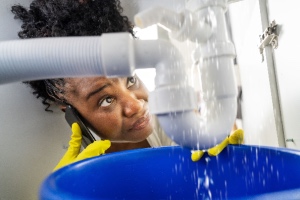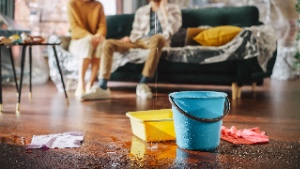
Avoid water leaks by regularly inspecting pipes and promptly repairing any damages.
More...
Water leaks can become a homeowner's biggest headache, inflicting damage on your property and potentially leading to repair bills that run into the thousands of dollars.
However, with proper maintenance and a few preventative measures, you can avoid costly water leaks in your home.
It's essential to understand the common causes of water leaks, which often include worn-out pipes, fittings or clogged drains.
Address potential issues early to prevent them from becoming significant problems. Scheduling periodic checks with a professional plumber can uncover concealed issues.
This post offers essential advice on preventing water leaks and expensive repair headaches.
Avoid Water Leaks with Simple Habits
Implementing simple habits such as monitoring your water bill for unusual increases or inspecting your appliances regularly for signs of leakage can also play a crucial role in early detection.
Moreover, investing in quality waterproofing and insulation materials is a wise decision that pays off in the long run.
Furthermore, these materials safeguard your home against moisture intrusion, which is a leading cause of mold and structural damage.
Regularly check pipe joints and connections throughout your home to avoid water leaks.
Also, educating yourself about the layout of your plumbing system enables you to respond swiftly in case of an emergency, minimizing potential damage.
Adhering to these practices and regularly maintaining your system minimizes water leak risks.
Consequently, this proactive approach protects your property and ensures peace of mind, knowing your home remains safe and dry.
Importance of Regular Inspections
One of the most effective ways to avoid costly water leaks is to inspect your plumbing system regularly. Inspect pipes, faucets, toilets, and appliances for leakage or corrosion signs.
Watch for wall dampness, musty smells, rising water bills, and signs of possible leaks. Then, you should install quality water sensors to detect and avoid water leaks quickly.
Furthermore, periodic roof inspections are essential to avoiding leaks and shielding your residence from significant harm.
Similarly, keep your gutters clear of obstructions to efficiently channel rainwater away from the base of your home, thus averting potential flooding in your basement.
While slightly off-topic, monitoring your water for any issues with tannins is crucial, which can affect its quality and appearance.
To emphasize the main point: actively maintain clean gutters to avoid water damage in your basement.
Invest in Quality Plumbing Fixtures
Investing in high-quality plumbing fixtures is another crucial tip for avoiding costly water leaks.
Due to poor construction materials, cheap bathroom and kitchen faucets and shower heads are more likely to develop leaks over time, so investing in durable, high-quality fixtures like brass or stainless steel minimizes leak risks.
Additionally, consider upgrading old pipes with newer materials like copper or PEX tubing, less prone to corrosion and rust.
By proactively replacing outdated plumbing components before they fail, you can avoid potential water damage disasters down the line.
Avoid Water Leaks With Regular Pressure Checks
High water pressure may seem luxurious when taking a shower, but it can strain your plumbing system unnecessarily, leading to pipe bursts and leaks.
Therefore, install a pressure regulator to keep your home's water pressure below 80 psi.
Meanwhile, excessive pressure causes fitting joints within pipes to weaken over time, resulting in small drips that later become significant issues.
To check if there might be an issue regarding this, have professionals come out once every year so they can do some testing, too.
Recognize the Common Causes of Water Leaks
To effectively manage and prevent water leaks, it is crucial first to identify their common causes. Understanding where leaks typically occur allows for targeted preventative measures.
Subsequently, one of the primary areas to watch is the home's pipes and plumbing connections.
Regular inspections are crucial in older homes, as they can help preempt potential failures before they lead to severe issues.
Another critical area to monitor is the roof and gutters. Ensure a clean gutter and intact roof to stop water from leaking through openings.
At the same time, ensuring these areas are intact and functioning can significantly reduce the risk of water damage.
Prevent Seasonal Water Leaks in Your Home
Explore how changing seasons elevate water leak risks in your home.
For instance, during colder months, the risk of pipes freezing and bursting increases dramatically.
Thus, regularly check your plumbing systems to avoid water leaks and prevent extensive damage.
In the interim, homeowners can further safeguard their residences against leak-related damages by incorporating insulation strategies and modern monitoring technology.
By proactively addressing these common vulnerabilities, you can enhance the longevity of your home's infrastructure and avoid costly repairs down the line.
Transitioning from reactive to preventive measures saves money and ensures peace of mind during adverse weather conditions.
Seal Cracks and Gaps
Inspecting window seals, doors, pipes entering through walls, checking to weatherstrip around doors, and chimney flue sealing off unwanted drafts is essential to maintaining the house and preventing leaking damage.
However, hiring someone to repair window sealant, cracks, and gaps helps keep moisture outside where it belongs.
Remove sources of potentially dangerous chemicals that could expose the drywall insulation to mold and mildew growth.
Therefore, cleaning up spills and repairing wall holes are necessary to prevent major problems from occurring soon.
Fixable ones fix as fast as possible, just letting them linger longer, needing attention quickly.

In the Final Analysis
Preventing water leaks not only saves money but also preserves the integrity of your home.
By adhering to these practical tips, conducting regular maintenance, and staying vigilant, you can effectively avoid the pitfalls of water damage.
Then, regularly check pipe joints and connections to avoid water leaks and prevent extensive damage.
It's essential to regularly inspect areas prone to leaks, such as bathrooms, kitchens, and basements.
Identifying moisture or minor leaks can avert more significant, more expensive issues later.
Furthermore, integrating smart home technologies like water sensors can provide extra protection by alerting you to leaks before they escalate. Yet, these devices are particularly useful in hidden or hard-to-reach areas.
Transitioning from reactive to proactive measures is crucial in maintaining a safe and dry environment.
Consulting with a professional is always the best course of action when in doubt.
As a result, plumbing and water management experts can offer tailored advice and advanced solutions that ensure your home remains secure against water-related issues.
Investing in these preventative strategies safeguards your home while potentially increasing its value.

